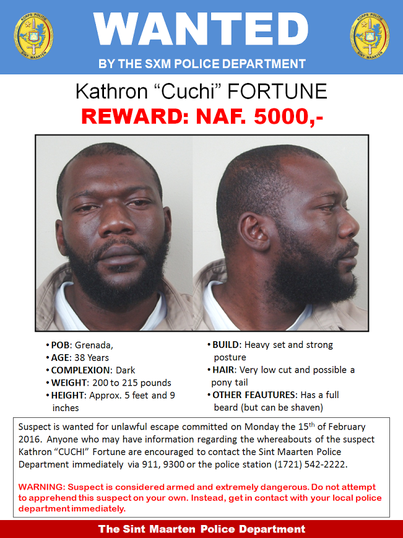Update Details Serial Killer Kathron Cuchi Fortune Horrific Crimes in St Maarten
Serial Killer Kathron “Cuchi” Fortune to Be Extradited from the Netherlands to Guadeloupe https://sxmnews.ai/tuesday-morning-accident-already-sxmnews-ai-st-maarten/

Kathron “Cuchi” Fortune, a name that has become synonymous with violent crime and terror in the Caribbean, is set to be extradited from the Netherlands to Guadeloupe. The notorious serial killer has spent years evading justice, embroiled in legal battles, and escaping imprisonment, but the recent decision marks a significant turn in his long and brutal history. The extradition will allow French authorities in Guadeloupe to prosecute Fortune in person for a litany of violent crimes, including the 2006 rape and murder of French citizen Angélique Chauviré on the island of St. Martin. https://sxmnews.ai/rip-police-investigate-second-fatal-traffic-incident-in-simpson-bay-cyclists-dies/
A Decades-Long Criminal Trail
Kathron Fortune’s life has been marred by violence and crime from an early age. Born in Grenada, Fortune grew up with seven siblings in a household fraught with hardship. Seeking better opportunities, his family eventually emigrated to Aruba. However, the young man’s early brushes with the law set the stage for a lifetime of criminal activity.
Fortune first made headlines in 1989 when, at the age of 22, he was sentenced to three years in prison for a violent robbery at a jewelry store in Sint Maarten. This was just the beginning. In 2001, he received an eight-year sentence for violent crime and extortion. By the mid-2000s, Fortune had become a hardened criminal, his name feared across the Caribbean.
The defining moments of his violent legacy came in 2005 and 2006. In November 2005, Fortune was convicted of murdering a man on Sint Maarten, followed by another murder in April 2006. His victims were men whose deaths he would later claim were matters of self-defense, though the brutal nature of the crimes suggested otherwise. These murders solidified his reputation as one of the region’s most dangerous individuals.https://stmaartennews.ai/firework-show-in-simpson-bay-lagoon-this-thursday-january-9-at-10-pm/
The Tragic Case of Angélique Chauviré
Among the many victims linked to Fortune, none sparked more outrage and sorrow than the case of Angélique Chauviré. Originally from Maine-et-Loire, France, Chauviré had been living in Grand Case, St. Martin, since 1999. Known as an active and beloved member of the community, her disappearance in May 2006 during a morning jog shocked the island.
Days later, her body was discovered on the Dutch side of St. Martin. Investigators revealed that Chauviré had been raped and stoned to death in an act of unspeakable brutality. Fortune, already a suspect in multiple murders, admitted to knowing the victim but denied killing her. Despite his protests, the evidence painted a damning picture. In 2020, the Basse-Terre Assize Court in Guadeloupe sentenced Fortune in absentia to 30 years in prison for Chauviré’s murder. His extradition will now ensure that he faces trial in person, giving her family and the community a chance to see justice served.
Escapes and International Pursuit
Fortune’s criminal activities were not confined to one jurisdiction, and his ability to evade justice for years is a testament to his cunning and ruthlessness. In 2007, he was sentenced to 21 years in prison for the murders of the two men in 2005 and 2006. However, his incarceration was short-lived. In 2016, during a medical visit outside the Sint Maarten penitentiary, Fortune orchestrated a daring escape.
His time on the run was marked by more violence. During his months as a fugitive, he murdered two Dominican men, Luis David “Blanco” Sarante Diz and Erwin “Eggy” Rosario Contreras, both 23 years old. Their bodies were discovered in Simpson Bay on the Dutch side of Sint Maarten. Fortune claimed self-defense once again, but the brutality of the murders and the subsequent attempts to conceal the bodies suggested otherwise. His brother, Tito Jahatan Fortune, was later convicted for his role in helping hide the victims, and Kalaika KK Simmons, the mother of one of Fortune’s children, was also arrested in connection with the case.
Fortune’s reign of terror came to an end in 2016 when he was apprehended by authorities in St. Kitts and Nevis and returned to Sint Maarten. By then, his notoriety had reached its peak, and he was transferred to a maximum-security prison in the Netherlands following Hurricane Irma’s destruction of the Sint Maarten penitentiary in 2017.

Life Behind Bars in the Netherlands
Since his transfer to the Netherlands, Fortune has been incarcerated in one of the country’s most secure facilities, housing its most dangerous criminals. Even behind bars, his violent past continued to haunt him. In 2019, while serving his sentence, he was convicted of a double homicide committed in December 2016 in Sint Maarten. The victims, a couple of Dutch tourists, added to the grim tally of lives lost to Fortune’s brutality.
Fortune’s incarceration in the Netherlands was not without controversy. He repeatedly petitioned for a return to the Caribbean, citing harsh prison conditions and his desire to reconnect with his family. During a 2022 appeal, a psychiatric report concluded that Fortune did not suffer from any mental illness, affirming that his actions stemmed from a deeply ingrained pattern of violence rather than psychological instability. The Dutch prosecutor opposed his release, arguing that he remained a dangerous and ruthless individual.
The No Limit Soldiers and Organized Crime
In addition to his individual acts of violence, Fortune is accused of being a member of the No Limit Soldiers (NLS), a notorious gang involved in drug trafficking between the Caribbean and Europe. The NLS has long been associated with organized crime, fueling violence in the region. Fortune, however, has consistently denied any affiliation with the gang. Despite his denials, law enforcement agencies have pointed to his alleged connections with the group as evidence of his involvement in larger criminal networks.
The Road to Extradition
The decision to extradite Fortune to Guadeloupe marks the culmination of years of international legal wrangling. French authorities have been determined to bring him to justice for the murder of Angélique Chauviré, a case that remains a symbol of the devastation wrought by violent crime in the Caribbean. The extradition process has been fraught with challenges, including Fortune’s appeals and his insistence on returning to Sint Maarten or Grenada.
The Dutch prosecutor’s office has emphasized the importance of ensuring Fortune faces trial in person, arguing that his crimes demand accountability. The extradition will take place under maximum-security conditions, reflecting the high-risk nature of transferring a criminal of Fortune’s notoriety.
The Legacy of Kathron “Cuchi” Fortune
As Fortune prepares to be extradited to Guadeloupe, his legacy remains a chilling reminder of the violence that has plagued the Caribbean for decades. Dubbed the Caribbean’s first serial killer, his story is one of brutality, manipulation, and a relentless ability to evade justice.
For the families of his victims, the extradition represents a long-awaited opportunity for closure. For the Caribbean, it serves as a cautionary tale about the far-reaching consequences of unchecked violence and organized crime. As Fortune faces trial, the hope is that his case will signal a turning point in the fight against impunity and the pursuit of justice in the region.
Fortune’s extradition is not just about one man; it is a statement that even the most elusive criminals will eventually be held accountable. It is a testament to the resilience of law enforcement, the determination of victims’ families, and the enduring quest for justice in the face of unimaginable tragedy.

